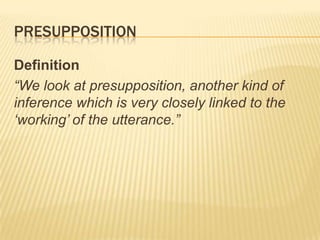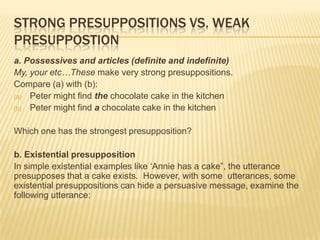Presupposition lecture
- 1. PresuppositionDefinitionâWe look at presupposition, another kind of inference which is very closely linked to the âworkingâ of the utterance.â
- 2. presuppositionâDid you get a good look at my face when I took your purse?âA burglar, decided to defend himself.What does his utterance presuppose?
- 3. Truth-Value1. Truth-valueTruth-value based on languageMy mother is a womanTruth-value based on what is happening in the world.My mother is a doctor
- 4. Exercice 3.1, page 17.Types of utterances:DeclarativesImperativesExercice 3.2 p. 19
- 5. PresuppositionsDifference between DIRECTLY ASSERTS and PRESUPPOSESExamplesPeter looked for the keys, directly asserts, âPeter has looked for the keysâWhere has Peter looked for the keys? Presupposes âPeter has looked for the keysâAnnie has a sofa directly asserts âAnnie has a sofaâDonât sit on Annieâs sofa presupposes âAnnie has a sofaâExercice 3.3 page 20
- 6. Strong presuppositions vs. weak presuppostiona. Possessives and articles (definite and indefinite)My, your etcâĶThese make very strong presuppositions.Compare (a) with (b):Peter might find the chocolate cake in the kitchenPeter might find achocolate cake in the kitchenWhich one has the strongest presupposition? b. Existential presuppositionIn simple existential examples like âAnnie has a cakeâ, the utterance presupposes that a cake exists. However, with some utterances, some existential presuppositions can hide a persuasive message, examine the following utterance:
- 7. PresuppositionâYouâll want DomeBeGone, my revolutionary cure for baldnessâObviously, the message directly asserts that you want this product. However, inside the noun phrase my revolutionary cure for baldness lurk several quite dubious messages:There is cure for baldnessThe cure is revolutionaryI have the cureAdvertisers use presupposition as a tool to make indirect assertions.Exercice 3.5 and 3.6 p. 21






